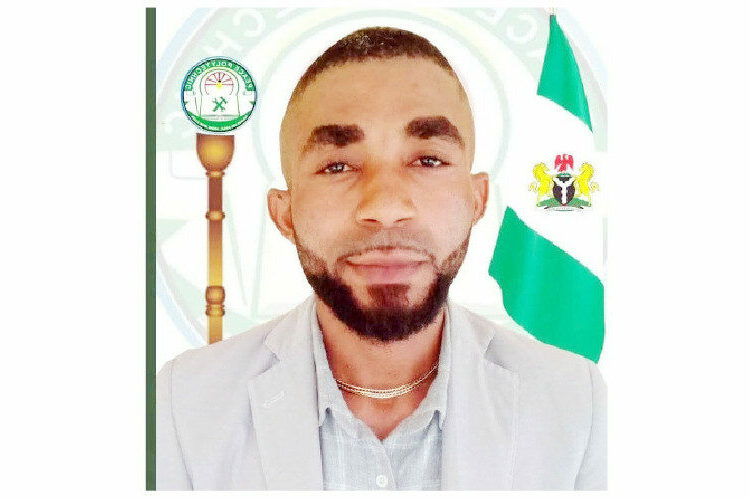The tragic death of 26-year-old Samuel Sampson Udo, a former Student Union Government (SUG) president of Peace Institute of Management and Technology (Peace Poly) in Abak, Akwa Ibom State, during the funeral rites of his father, a respected community leader in Cross River State , has sent shockwaves through his family, community members, friends, and well-wishers. The brutality of the incident and the loss of such a promising young life will not be forgotten anytime soon.
The gathering had been in honour of the deceased, but in an instant, everything changed. Gunfire erupted, a clash between rival cult groups tore through the air, striking the victim, Samuel Udo, as he ran for cover. The laughter, pleasantries, songs and bustle turned into screams and chaos as people were running into their homes, locking their doors,” a resident, Utum Ofem Ubi disclosed.
The deadly crossfire shattered the evening calm and sent waves of panic through the neighborhood and among mourners.
According to eyewitnesses, the incident occurred around 2 a.m. on October 31, 2025, during a show of strength between members of rival cult gangs. The clash claimed the life of Udo and left 29-year-old Miss Choice Ikenger, and a few others critically injured, with bullets still lodged in her body.
For his mother and siblings who are yet to recover from the shock of the way his body was scattered with bullets but the rival cult members, it’s a memory , they never wished to have had.
Udo’s sister, Miss Affiong Sampson, described the incident as a brutal act of violence, saying, “They shot him with bullets as if he was an animal. His body is still in the mortuary, the entire family had remained in grief since he was killed.”
Ikenger’s mother, Silvia, echoed the family’s pain, “My daughter had been lying down in serious pain at the hospital. We have gone through a lot, struggling to get our daughter healed after that incident.” She maintained.
Cult clashes and killings have become a recurrent theme in Cross River State, with several incidents often going unreported. In 2025 alone, at least nine people have lost their lives in separate cult‑related incidents. The latest tragedy in Ekori has plunged the community into panic, with residents now gripped by fear of further attacks.
Indeed, recent years have shown how deeply rooted the problem is. In April 2025, a cult clash in Camp 2 Mfamosing community, Akamkpa LGA, left five people dead following a retaliation attack. During the same year, two more were killed in Ikom LGA in a confrontation between the Vikings and KK confraternities.
Legal and civic leaders have also sounded the alarm: former aide Okoi Obono-Obla has raised concerns over increasing cult violence and alleged links between some cult groups and local government officials in Yakurr LGA.
This latest incident must serve as a wake-up call because, at this point, the state government needs to urgently tackle the proliferation of cultism, restore trust in security, and ensure communities are safe.
The specter of cultism is rapidly erasing the bright future of the youths that are considered the glory and the promise of the next generation, leaving a trail of wasted potential and shattered dreams in its wake.
What began as a fringe element on university campuses has now permeated nearly every corner of society, transforming young men and women into foot soldiers in a brutal war that is ravaging their minds, bodies, and spirits. The initiation process into these secret cults is one of the most horrifying aspects of this scourge. What begins as an allure of brotherhood and power has quickly become a descent into the macabre.
To prove their loyalty and “strength,” initiates are subjected to painful and degrading rituals. Often, they are beaten to the point of unconsciousness, their bodies scarred for life as a testament to their indoctrination. Also, it is not uncommon for initiates to be forced to commit unspeakable acts, including murder, to demonstrate their resolve.
Even more disturbing are the rituals that follow. These young men and women are often required to drink human blood or partake in human sacrifices. Some cults go diabolical, believing that these horrifying acts would protect them from harm, making them impervious to bullets or invisible to their enemies. Such beliefs, while baseless, are fervently adhered to, and they further fuel the cycle of violence.
Disturbingly, what was once limited to university campuses, is now also a menace in secondary schools across the country. Teenagers, barely out of childhood, are recruited into these secret societies, and soon become embroiled in bloody wars over territory, power, and pride. In universities, the situation is no better. Students brandish guns as casually as they do notebooks, turning lecture halls into battlegrounds.
There are alao.documented instances of cult-related killings involving final-year students at CRUTECH , that is , Cross River University of Technology.
In July 2019, a final-year Electrical Engineering student identified only as James was shot multiple times while writing his first-semester exam in the old Engineering building, Calabar .
After being shot, he was reportedly hacked to death with an axe to ensure he didn’t survive.
The police confirmed the killing and linked it to cult rivalry, it was a power struggle among cult groups.
Another report revealed also that some students in the exam hall hastily submitted blank answer sheets and left when the gunfire started.
In a separately, a final-year student named Felix Egot (from the Elementary Education department) was also killed by suspected cultists on campus.
According to a security‑study, the University of Calabar, )UNICAL) also faces cult-related security challenges, though not necessarily significantly fewer than CRUTECH.
These incidents show that cult violence on campus , has directly affected students during exam periods , a deeply tragic situation.
In March 2017, a student was shot in the “love garden” area of UNICAL hostel by fleeing cultists.
In October 2019, five UNICAL students were paraded by police for alleged cultism.
These incidents show that cult violence is not limited to fringe confrontations: students preparing for exams have been attacked, and some cult confrontations happen on campus grounds.
There is a well-documented case of a lecturer , whose name was given as Dr. E a lecturer in the Department of Accounting, was assassinated in 2017. His murder sparked a cult war. According to reports, he was allegedly involved in a cult group, and his killing by a rival group triggered retaliatory violence.
Another case was in 2012, where am Associate Professor , Felix Akpan (Head of Public Administration at UNICAL) was shot by gunmen
Though it was unclear from the report whether tje incident was explicitly cult‑related, but some linked it to campus violence
The violence at CRUTECH appears especially severe, with deadly clashes even during exams.
At UNICAL, while killings may be less frequently reported in recent years compared to CRUTECH, cult presence and arrests remain a serious concern for campus security.
A social critic, Mr. Mbeh Egbe, accused the government of failing to protect citizens from cult attacks. “Killers are literally getting away with murder because perpetrators of these heinous crimes are not being arrested or punished,” he said.
Dr. Asuquo Etim, a criminologist, explained that cultism is driven by a desire for power, status, and economic gain, often fueled by unemployment, poverty, and limited opportunities. “Cultism is a complex issue. It’s a vicious cycle that’s difficult to break, and it thrives in environments where young people have few alternatives,” he noted.
The community leader, Chief Barr. Okoi Obono-Obla, called on security agencies to take urgent action to curb the violence. “Unless immediate steps are taken by security agencies and stakeholders, the situation could escalate into a full-scale blood conflict,” he warned.
Okoi Obono-Obla, accused those in positions of authority of doing little to maintain peace and order in the local government area. He stressed that, over the years, he had consistently raised alarms about the growing social decay fueled by unscrupulous politicians, misguided community leaders, and disoriented youths whose actions continue to undermine development and peace across the state.
Obono-Obla called on responsible leaders, security operatives, and peace-loving citizens to act swiftly to prevent further loss of lives and restore calm to the community. He maintained that the tragedy occurred when a group of drug-influenced, trigger-happy cultists unleashed terror during a wake-keeping ceremony.
“In the attack, the son of the deceased community leader, Mr. Sampson Udo, was brutally gunned down, plunging the community into chaos,” he said.
The call for urgent action has been echoed by many residents, who are demanding that the government take concrete steps to address the growing security challenge in Ekori and across the state.
Responding to the concerns, the deputy Police public relations officer, Igiri Ewa, assured that mechanisms are in place to tackle cult activities. “We have several discreet investigations ongoing to identify the perpetrators of this dastardly act and bring them to justice,” he said.
As the people of Cross River State grapple with the reality of cult violence, one thing is clear: breaking the cycle will require a concerted effort from the government, security agencies, and the community.
The impact of cult-related violence is devastating, leaving families and entire communities traumatized. As one resident and youth leader of Ekori community, Mr. Omini Ebri, lamented, “We’re living in a state of constant fear, and it’s not just about the killings. It’s about the future of our children and the future of our community.”
Shockingly, for fear of further attacks, residents of Ekori community now live in constant anxiety, too afraid to speak out even when asked to provide information that could help security agents apprehend the perpetrators of the heinous act.
A youth leader in Akparabong community in Ikom local government area of Cross River State Comrade Ojong Amba said that “It is imperative for everyone to work together to break the cycle of violence and restore peace in communities the state.
“The people of Cross River State deserve to live in peace and safety, and it is their collective responsibility to ensure that this becomes a reality.
“We must all join hands to build a safer and more peaceful Cross River State, where everyone can live without fear of cult violence. We must not fail the people of Cross River State.” He maintained.
The youth leader’s call for action has been echoed by many residents, all demanding that the government take decisive steps to confront the escalating security crisis. The situation in Cross River State underscores one undeniable truth: cult violence is a deeply rooted and complex problem, one that cannot be solved through isolated measures.
LEADERSHIP Weekend writes that breaking this deadly cycle will require a united front. Government authorities, security agencies, community leaders, and the general public must work together with urgency and purpose. The people of Cross River State are crying out for protection, and their voices must not only be heard but acted upon
The government must shoulder its responsibility to safeguard lives and ensure that no more families are torn apart by senseless violence. Security agencies, on their part, must adopt a more proactive and intelligence-driven approach to crime prevention, ensuring that perpetrators of cult attacks are tracked, arrested, and prosecuted without delay.
Our correspondent hereby reminds community leaders also , that they have vital role to play. By openly condemning cult activities and promoting peace, dialogue, and unity, they can help steer vulnerable youths away from destructive paths. Equally important is the vigilance of the general public. Reporting suspicious activities, supporting law enforcement, and fostering a culture of collective responsibility are essential steps toward building a safer and more peaceful society.
Only through shared commitment can Cross River State begin to reclaim its communities from the grip of cult violence and restore the peace its people so desperately seek
The call for urgent action has been echoed by many residents, who are demanding that the government take concrete steps to address the growing security challenge in Ekori and across the state.





